homepage news
HIV patients in the South face uphill battle
Poverty, lack of health care among problems
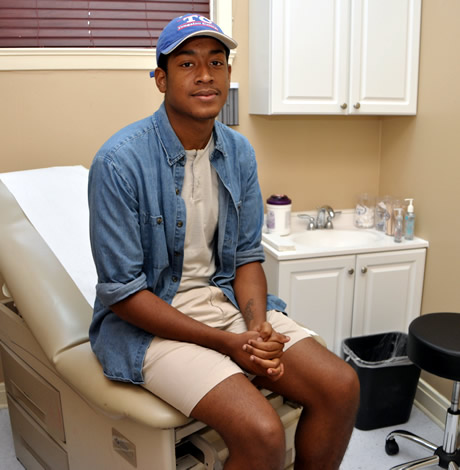
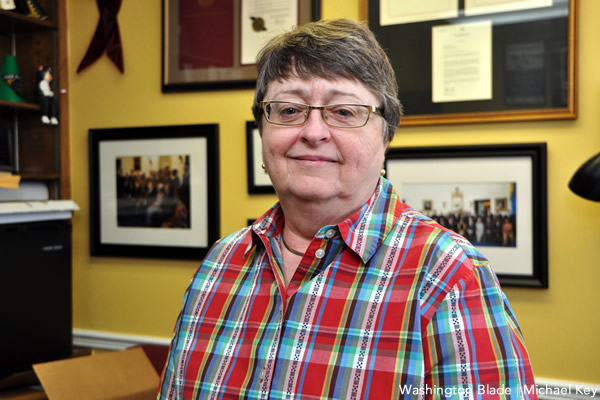
AIDS Alabama CEO Kathie Hiers (Washington Blade photo by Michael Key)
BIRMINGHAM, Ala. — AIDS Alabama CEO Kathie Hiers will “never forget” the day in 1985 when she and her partner were at Denny’s in her hometown of Mobile, Ala., when six of her “best gay boyfriends walked in” and said they had all tested positive for HIV.
They had gone to nearby Pensacola, Fla., to get tested because Florida offered anonymous testing, unlike Alabama.
“I was like ‘Oh my God, what is happening,’” Hiers told the Washington Blade during a July 16 interview at her Birmingham office before traveling to the 2014 International AIDS Conference in Australia. “Today one of those six guys is still alive.”
More than three decades after the Centers for Disease Control and Prevention reported the first cases of what became known as AIDS, the epidemic continues to have a disproportionate impact on the South.
The CDC in 2010 noted nearly half of all new HIV infections in the U.S. were in the South, according to a policy report from the Southern AIDS Coalition. Eight of the 10 states with the highest rates of HIV — Florida, Georgia, Louisiana, Mississippi, North Carolina, South Carolina, Texas and Tennessee — are in the region.
The CDC notes Florida, Louisiana, Mississippi and South Carolina are among the states with the highest rates of AIDS diagnoses.
Hiers said the statistics are slightly lower in Alabama because her organization has partnered with all of the state’s HIV/AIDS service organizations and works within all of its 67 counties.
“We’ve got a pretty cohesive network,” she said. “It’s very different than the other Southern states where you go to Atlanta and there’s a good bit, but you get outside Atlanta and there’s nothing. The same in Louisiana with New Orleans and so on.”
Hiers further noted the 1917 Clinic where a number of groundbreaking discoveries around HIV/AIDS have taken place is located at the University of Alabama-Birmingham.
“We’re always very connected to clinical trials and so on,” she said. “Those two things have helped Alabama.”
The Duke Center for Health Policy and Inequalities Research in 2011 noted Mississippi had the highest number of deaths from HIV of any state. Alabama, Florida, Georgia, Louisiana, North Carolina, South Carolina and Tennessee were among the top 10.
The U.S. Census also indicates that Mississippi is the poorest state in the country, with 22.3 percent of residents living below the poverty line between 2008-2012. Louisiana and Alabama have the second and fourth highest rates of poverty in the country respectively.
Statistics also indicate that people of color are more likely to live in poverty than whites.
“Part of what happens with people who are poor is they don’t go to the doctor,” Kathryn Garner, executive director of AIDS Service Coalition, an HIV/AIDS service organization in Hattiesburg, Miss., that serves people with the virus who live in 71 of the state’s 82 counties, told the Blade during a recent telephone interview. “If you don’t go to the doctor, you don’t know you’re HIV positive until you go to the doctor when you’re really sick and then you’re AIDS-defined.”
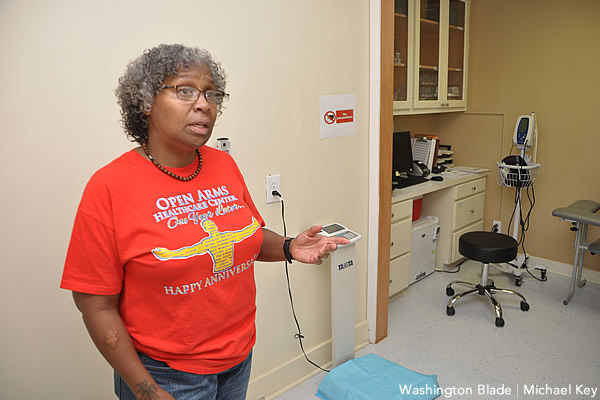
Charlotte “Dot” Norwood (Washington Blade photo by Michael Key)
Charlotte “Dot” Norwood, a prevention counselor at Open Arms Healthcare Center, an HIV/AIDS clinic in Jackson, Miss., that My Brother’s Keeper, an organization based in nearby Ridgeland, Miss., that seeks to reduce health disparities among minority groups, is known affectionately as the “AIDS Lady.”
She told the Blade during a July 11 interview at the clinic that patients with the virus are often unable to get a job.
“[They] go for an interview, don’t get hired and it could be for many reasons,” she said. “Sometimes I think it’s because you know maybe they go in and the person’s first perception… masculine, things like that.”
People with HIV/AIDS fall under the Americans with Disabilities Act. It also bans all public entities and private companies that employ more than 15 people from discriminating against their employees based on their status.
No Southern state bans anti-LGBT employment discrimination. Louisiana, Tennessee and Florida include sexual orientation in their anti-hate crimes statutes, but not gender identity and expression.
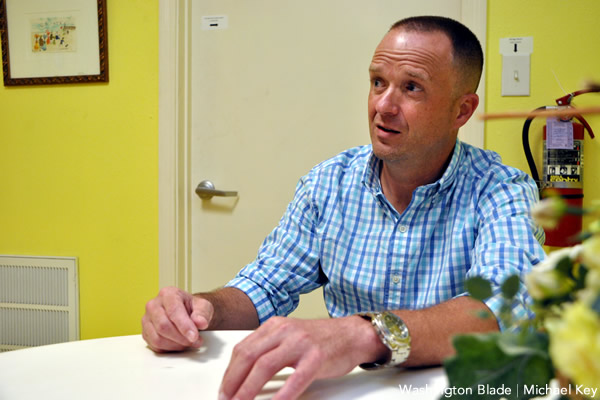
Carl Green (Washington Blade photo by Michael Key)
Carl Green, a gay white man who has lived at Belle Reve, a residence in the Fraubourg Marigny neighborhood of New Orleans for people with HIV/AIDS since May, told the Blade during a July 14 interview that he lost his job when he told his then-manager he was living with HIV after several hospitalizations.
Green said he eventually lost his home and lived in his car until a bank repossessed it.
The New Orleans AIDS Task Force, an HIV/AIDS service organization that serves people with the virus in the Crescent City and throughout southeastern Louisiana, referred Green to Belle Reve.
“It was the universe saying you need to go back to square one and get your health together,” said Green.
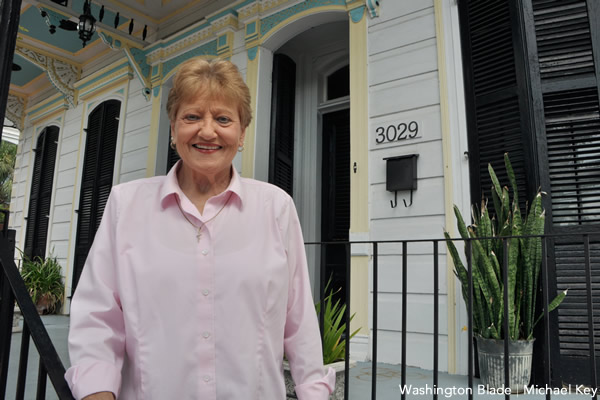
Belle Reve Executive Director Vicki Weeks (Washington Blade photo by Michael Key)
People with HIV struggle to find housing, food
The Fair Housing Amendments Act of 1988 bans discrimination against people living with HIV/AIDS and other disabilities.
In spite of this federal law, a lack of housing remains an acute problem for low-income people with HIV/AIDS in the South.
Fifteen people currently live in two group homes in Belle Reve — including one called Belle Grace that Executive Director Vicki Weeks joked opened because of the “grace of God.” A third building — Belle Esprit — has four apartments for couples and families that can accommodate between seven to 10 people with children at any given time.
Belle Reve was able to renovate all three of its buildings several years ago after it received $1,189,000 in funds from Housing Opportunities for People with AIDS (HOPWA) from the New Orleans Office of Community Development, $300,000 from the U.S. Department of Housing and Urban Development, grants from the National AIDS Fund and other groups and money from the Qatari government.
“I’m happy until I can get on my own and start over again,” a Belle Reve resident of color who describes himself as “very-much gay,” but asked to remain anonymous told the Blade. He worked at Tulane Hospital in New Orleans for four years before he tested positive in May 2013. “I’m looking for another job, but I’ve been having a little problem with that because I guess I’m gay. They look at you and they judge you.”
Miss Eddie, a 58-year-old transgender woman who has lived with HIV since the 1980s, moved from the New Orleans suburb of Kenner to Belle Reve in late May after her former lover died.
“It’s a great blessing being here,” she told the Blade.
Thirty-two people with HIV/AIDS currently live at Grace House, a residence in Jackson, Miss.
AIDS Services Coalition runs two residences in Hattiesburg for people living with the virus.
Eight men live in 121 Haven House, a Victorian home built in the 1880s that serves as a transitional shelter. More than a dozen women with HIV and a family live in a second facility — 227 Place — with nine two-bedroom apartments.
AIDS Service Coalition last month bought a 16-unit apartment complex with four fourplexes.
Garner said they should be renovated by the end of the year.
“Our goal of course if someone’s able to work or able to function out in the world,” she told the Blade. “We do everything we can to get them away so they can be out in the world and do the things everything they want to do.”
The South Mississippi AIDS Task Force in Biloxi, Miss., operates a transitional housing facility for people with HIV/AIDS on the state’s Gulf Coast.
“Everyone we have in any of our shelters either have no income or have disability or a low-paying job,” said Garner. “It’s really difficult if you’re making $790 a month when a one-bedroom apartment in Hattiesburg is $550 to $600 a month. The math on that just doesn’t work and there’s not enough public housing and there’s not enough housing choice vouchers.”
AIDS Alabama has one of the largest housing programs of any HIV/AIDS service provider in the South with roughly 150 units throughout the state. The majority of these are in Birmingham, the state’s largest city.
AIDS Alabama also offers rental assistance to people living with HIV across the state through HOPWA.
“Even so we always have waiting lists,” Hiers told the Blade. “Housing is just a huge need for people with HIV.”
HIV/AIDS service providers with whom the Blade spoke in Mississippi and Alabama said access to transportation and even food can adversely affect the health of people living with the virus — especially those who live in rural areas.
Dr. Laura Beauchamps, an infectious disease practitioner at Open Arms, told the Blade as she prepared to administer pre-exposure prophylaxis (PrEP) that many people with HIV/AIDS who live in rural areas are simply unable to travel to Jackson “to get checked on a regular basis.”
“They just don’t take care of themselves and they keep on spreading [the virus,]” she said as Norwood listened. “It is just very sad to see. In other states it’s not the same because they have a better transportation situation or ways to get them to the clinics and continue [with their treatment.]”
Garner told the Blade one of her organization’s clients who lives in a shelter in Columbus, Miss., travels to the state capital, which is nearly two hours away, to receive health care and HIV treatments. AIDS Service Coalition also provides her with support network, even though its offices are a 4-hour drive away from where she currently lives.
“She calls once a month and we visit,” said Garner. “We do what we can do.”
Hiers said the majority of AIDS Alabama’s clients in the Birmingham metropolitan area do not own cars. The agency has three vans that “run full time” to bring clients to their appointments and other commitments, but Hiers said “it’s not enough.”
Hiers described the city’s public transportation system as “pitiful,” noting an AIDS Alabama client who takes a 5:30 a.m. bus from his home to get to his job at 9:30 a.m. was almost fired because he was late.
Up to 170 families each month receive food assistance from Open Arms.
Norwood noted the food pantry in the back of the clinic that her son helps stock with donations was “a little bare” because the next delivery had yet to arrive from a local food bank. She told the Blade she personally delivers food to her clients who are hungry and are unable to travel to the clinic.
“I’ll step out of pocket and go get them myself, or take food,” said Norwood. “Sometimes I have my people who haven’t ate in a few days and they’ll call one of my guys. And my guys will call me and say ‘hey Dot, honey can you help me Dot?’ Oh yeah, that’s not even to be asked.”
Lack of education, stigma spread virus
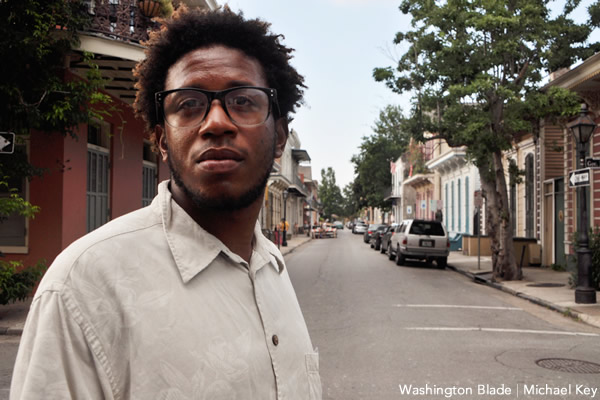
Timothy Thompson (Washington Blade photo by Michael Key)
Anti-HIV stigma also remains a serious problem for those living with the virus in the South.
Timothy Thompson, a peer educator with the New Orleans AIDS Task Force, told the Blade over dinner in the French Quarter on July 13 that many people who are disproportionately at risk for HIV in the city do not get tested because of the stigma attached to the virus.
“One of the biggest things is that there is the idea if I go and I test positive I’ll be alienized from my people, from my family or the people that I hang out with or things that I’m able to do I won’t be able to do anymore,” he said. “There is a level of truth to that because of the ongoing problems that are faced because of the ignorance that is around the disease itself.”
Thompson said people with HIV/AIDS with whom he has worked in New Orleans have told him that people did not want to have someone who is positive eat in their home because they think the virus spreads through saliva.
“They’re not aware of the different things that really transmit the disease as well as the different things that you can do to make sure that the people you are around that are affected about it still feel like they are normal human beings,” said Thompson. “You’re aware that this does not transmit this way and most people aren’t aware and they tend to offend people by their lack of education.”
The Blade heard similar stories from service providers and LGBT rights activists in Mississippi.
“We have folks — and this is 2014 — who are being asked in their family homes to eat off of paper plates,” said Garner.
Antwan Matthews, a gay man of color from Meridian, Miss., living with HIV, officially learned his status on April 24, 2013, the day before his 20th birthday.
He told the Blade during a July 11 interview at Open Arms where he will begin to receive care next month that his mother told him that his father, who is a Pentecostal minister, took out a life insurance policy on him after he found out he was positive.
“He’s almost gambling with my life,” said Matthews. “He’s just waiting for me to die or something.”
Matthews said his mother was initially supportive of him, but he said she pointed out his HIV status after they argued about his sister wanting to move out of the house once she had turned 18.
“She texts me and said ‘you wouldn’t listen, so look at you, you’re living with HIV now so you don’t have anything to say to me,’” said Matthews. “I was like OK. It kind of bothered me because you just don’t expect that to be said from your mom or your parents and stuff like that.”
The Belle Reve resident who asked to remain anonymous told the Blade he initially did not want to “introduce” his family in Lafayette, La., to “my HIV” because he thought they were not “going to accept it.”
“They did,” he said. “So I came here just to get myself together, for myself. So I came here and now they accept everything.”
Katrina disrupted HIV care, damaged facilities
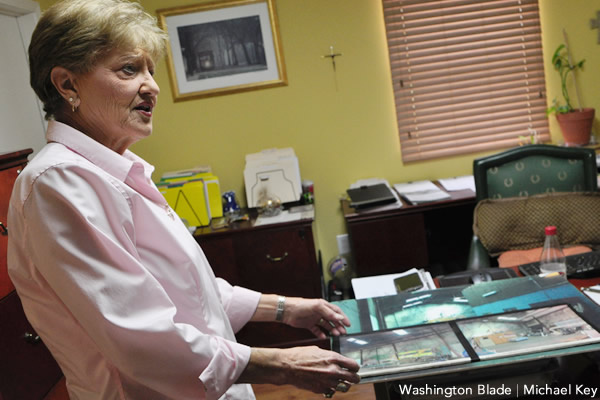
Belle Reve Executive Director Vicki Weeks (Washington Blade photo by Michael Key)
Weeks said eight of 12 people who were living at Belle Reve when Hurricane Katrina approached New Orleans in 2005 could not evacuate on their own because they — or their relatives — did not have access to transportation.
She and three other Belle Reve staffers used private vehicles to evacuate their residents to a campground in Alexandria, La., a city roughly 200 miles northwest of New Orleans.
The trip that normally takes less than four hours took 16 hours because of massive traffic jams.
Weeks, her residents and staff spent nearly three weeks at the campground before an HIV/AIDS service organization in Anniston, Ala., offered them housing and a place to work.
They remained in Alabama for seven months before returning to New Orleans.
“The city did not have an evacuation plan for people with no vehicles, and that’s why so many people stayed,” said Weeks, who lives in the Gentilly Terrace neighborhood of New Orleans that Katrina inundated with six feet of water. “That’s why they had so many people here because there was no transportation out of this city other than your own vehicle or a vehicle of a relative. We tried to get our residents to go with relatives or with churches, but we still have eight out of 12 that had no way to get out of town.”
Katrina damaged the roof of AIDS Service Coalition’s shelter.
Garner told the Blade a man living with HIV from New Orleans approached her after she arrived to survey the damage and said he only had two days worth of his antiretrovirals.
“That story replicated itself,” she said. “Basically what we did for several months was triage.”
Garner added an additional problem that people living with HIV/AIDS from other states who fled to Mississippi after Katrina is the state’s Medicaid program offered less generous benefits than they had been accustomed.
“If they were getting psychotropic medicines or if they were getting pain medicines or fill in the blank, they came to Mississippi and that wasn’t covered,” she said.
Service providers criticize governors for not expanding Medicaid
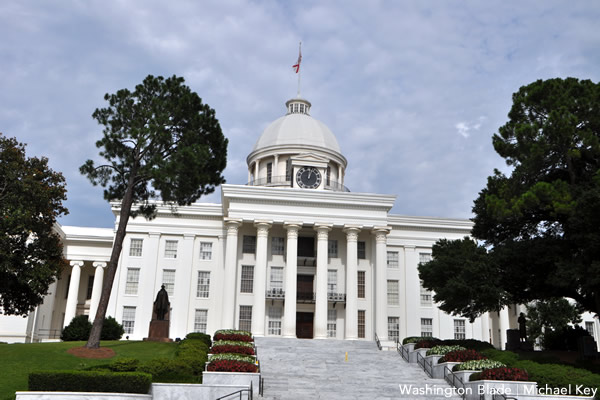
76 percent of those who are on the Alabama AIDS Drug Assistance Program would become eligible for Medicaid if Gov. Robert Bentley and the Republican-controlled Legislature expanded it, according to AIDS Alabama CEO Kathie Hiers. (Washington Blade photo by Michael Key)
A Gallup survey noted Texas had the highest rate of uninsured residents, with 27 percent of people without health insurance. Arkansas, Mississippi, Florida and Louisiana, Georgia and North Carolina were among the other states with the highest rates of uninsured residents.
Texas Gov. Rick Perry, Mississippi Gov. Phil Bryant, Florida Gov. Rick Scott, Louisiana Gov. Bobby Jindal, Georgia Gov. Nathan Deal and North Carolina Gov. Pat McCrory have all refused to expand their state’s Medicaid programs under the Affordable Care Act.
Hiers told the Blade the majority of the 13,000 Alabamians living with HIV are “extremely poor,” yet the state’s Medicaid program requires potential recipients to be disabled and have a monthly income of 13 percent of poverty level. She said this figure works out to around $111 a month.
Hiers added 76 percent of those who are on the Alabama AIDS Drug Assistance Program would become eligible for Medicaid if Gov. Robert Bentley and the Republican-controlled Legislature expanded it.
“I get so frustrated at our Southern states who need the health care the most not expanding Medicaid here,” said Hiers. “It’s just colossally stupid. We’re turning down billions and billions in health care for Alabamians and Southerners just because of the ideological differences between the parties. And I think that’s just wrong.”
Advocates and HIV/AIDS service providers with whom the Blade spoke in Mississippi, Louisiana and Alabama all said the vast majority of their funding comes from the federal government and private grants.
Eighty-five percent of AIDS Alabama’s annual budget of $7.9 million comes from federal sources, with HUD providing the majority of this money. The organization also receives financial support from the Ford Foundation, the Elton John Foundation, the Tide Foundation and other foundations.
HOPWA funds comprise 80 percent of Belle Reve’s $1 million annual budget.
“If we lose that there’s nothing else that we can do to keep the doors open,” Weeks told the Blade. “We have got to prepare for that.”
The Mississippi Department of Health runs a free STD clinic in Jackson where Beauchamps also works.
She told the Blade that she and her colleagues are able to find “a lot of people” there who are positive.
Beauchamps nevertheless stressed the state does not extend enough resources to her and other HIV/AIDS service providers to fight the epidemic.
“We need more grants,” said Beauchamps. “We need more support to do more testing and then to reach out in communities that don’t have a way to come all the way down to the metro area.”
Weeks criticized Louisiana lawmakers and Jindal for cutting state education and health care funding.
She noted the closest mental health clinic to Belle Reve is in Hammond, a city about an hour northwest of New Orleans, because Jindal closed the facility that had been in the Crescent City.
“All I can say is that we’re not happy with some of the issues or some of the things that our governor, Bobby Jindal, has done,” said Weeks. “We all get upset when he cuts funding for education or health care, but the state’s budget is in state law that they can’t touch any of this other stuff. That only leaves education and health care. So whoever set our government up did a very poor job.”
’I’m doing a 100 percent better’
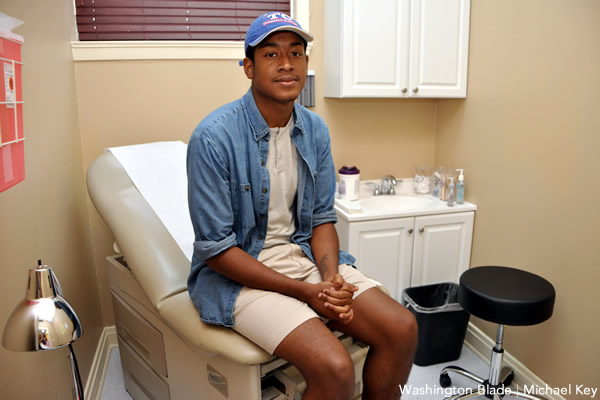
Antwan Matthews (Washington Blade photo by Michael Key)
In spite of the steep challenges, people living with HIV/AIDS and those who support them remain optimistic.
Matthews has begun speaking with teenage boys about the virus. He is also fighting to include HIV/AIDS in school curricula.
“They need to be taught,” he told the Blade. “It’s just like anything else: English, history, math, anything else that they learn. They should learn about this.”
Green has once again began taking antiretrovirals after a three year lapse.
He also had surgery last month to remove a cancerous tumor from his rectum.
“I’m doing a 100 percent better,” said Green. “It’s like I’m getting back in touch with me and getting my priorities back together. I just don’t think I would have still been on this earth. I really don’t.”
homepage news
Honoring the legacy of New Orleans’ 1973 UpStairs Lounge fire
Why the arson attack that killed 32 gay men still resonates 50 years later

On June 23 of last year, I held the microphone as a gay man in the New Orleans City Council Chamber and related a lost piece of queer history to the seven council members. I told this story to disabuse all New Orleanians of the notion that silence and accommodation, in the face of institutional and official failures, are a path to healing.
The story I related to them began on a typical Sunday night at a second-story bar on the fringe of New Orleans’ French Quarter in 1973, where working-class men would gather around a white baby grand piano and belt out the lyrics to a song that was the anthem of their hidden community, “United We Stand” by the Brotherhood of Man.
“United we stand,” the men would sing together, “divided we fall” — the words epitomizing the ethos of their beloved UpStairs Lounge bar, an egalitarian free space that served as a forerunner to today’s queer safe havens.
Around that piano in the 1970s Deep South, gays and lesbians, white and Black queens, Christians and non-Christians, and even early gender minorities could cast aside the racism, sexism, and homophobia of the times to find acceptance and companionship for a moment.
For regulars, the UpStairs Lounge was a miracle, a small pocket of acceptance in a broader world where their very identities were illegal.
On the Sunday night of June 24, 1973, their voices were silenced in a murderous act of arson that claimed 32 lives and still stands as the deadliest fire in New Orleans history — and the worst mass killing of gays in 20th century America.
As 13 fire companies struggled to douse the inferno, police refused to question the chief suspect, even though gay witnesses identified and brought the soot-covered man to officers idly standing by. This suspect, an internally conflicted gay-for-pay sex worker named Rodger Dale Nunez, had been ejected from the UpStairs Lounge screaming the word “burn” minutes before, but New Orleans police rebuffed the testimony of fire survivors on the street and allowed Nunez to disappear.
As the fire raged, police denigrated the deceased to reporters on the street: “Some thieves hung out there, and you know this was a queer bar.”
For days afterward, the carnage met with official silence. With no local gay political leaders willing to step forward, national Gay Liberation-era figures like Rev. Troy Perry of the Metropolitan Community Church flew in to “help our bereaved brothers and sisters” — and shatter officialdom’s code of silence.
Perry broke local taboos by holding a press conference as an openly gay man. “It’s high time that you people, in New Orleans, Louisiana, got the message and joined the rest of the Union,” Perry said.
Two days later, on June 26, 1973, as families hesitated to step forward to identify their kin in the morgue, UpStairs Lounge owner Phil Esteve stood in his badly charred bar, the air still foul with death. He rebuffed attempts by Perry to turn the fire into a call for visibility and progress for homosexuals.
“This fire had very little to do with the gay movement or with anything gay,” Esteve told a reporter from The Philadelphia Inquirer. “I do not want my bar or this tragedy to be used to further any of their causes.”
Conspicuously, no photos of Esteve appeared in coverage of the UpStairs Lounge fire or its aftermath — and the bar owner also remained silent as he witnessed police looting the ashes of his business.
“Phil said the cash register, juke box, cigarette machine and some wallets had money removed,” recounted Esteve’s friend Bob McAnear, a former U.S. Customs officer. “Phil wouldn’t report it because, if he did, police would never allow him to operate a bar in New Orleans again.”
The next day, gay bar owners, incensed at declining gay bar traffic amid an atmosphere of anxiety, confronted Perry at a clandestine meeting. “How dare you hold your damn news conferences!” one business owner shouted.
Ignoring calls for gay self-censorship, Perry held a 250-person memorial for the fire victims the following Sunday, July 1, culminating in mourners defiantly marching out the front door of a French Quarter church into waiting news cameras. “Reverend Troy Perry awoke several sleeping giants, me being one of them,” recalled Charlene Schneider, a lesbian activist who walked out of that front door with Perry.

Esteve doubted the UpStairs Lounge story’s capacity to rouse gay political fervor. As the coroner buried four of his former patrons anonymously on the edge of town, Esteve quietly collected at least $25,000 in fire insurance proceeds. Less than a year later, he used the money to open another gay bar called the Post Office, where patrons of the UpStairs Lounge — some with visible burn scars — gathered but were discouraged from singing “United We Stand.”
New Orleans cops neglected to question the chief arson suspect and closed the investigation without answers in late August 1973. Gay elites in the city’s power structure began gaslighting the mourners who marched with Perry into the news cameras, casting suspicion on their memories and re-characterizing their moment of liberation as a stunt.
When a local gay journalist asked in April 1977, “Where are the gay activists in New Orleans?,” Esteve responded that there were none, because none were needed. “We don’t feel we’re discriminated against,” Esteve said. “New Orleans gays are different from gays anywhere else… Perhaps there is some correlation between the amount of gay activism in other cities and the degree of police harassment.”

An attitude of nihilism and disavowal descended upon the memory of the UpStairs Lounge victims, goaded by Esteve and fellow gay entrepreneurs who earned their keep via gay patrons drowning their sorrows each night instead of protesting the injustices that kept them drinking.
Into the 1980s, the story of the UpStairs Lounge all but vanished from conversation — with the exception of a few sanctuaries for gay political debate such as the local lesbian bar Charlene’s, run by the activist Charlene Schneider.
By 1988, the 15th anniversary of the fire, the UpStairs Lounge narrative comprised little more than a call for better fire codes and indoor sprinklers. UpStairs Lounge survivor Stewart Butler summed it up: “A tragedy that, as far as I know, no good came of.”
Finally, in 1991, at Stewart Butler and Charlene Schneider’s nudging, the UpStairs Lounge story became aligned with the crusade of liberated gays and lesbians seeking equal rights in Louisiana. The halls of power responded with intermittent progress. The New Orleans City Council, horrified by the story but not yet ready to take its look in the mirror, enacted an anti-discrimination ordinance protecting gays and lesbians in housing, employment, and public accommodations that Dec. 12 — more than 18 years after the fire.
“I believe the fire was the catalyst for the anger to bring us all to the table,” Schneider told The Times-Picayune, a tacit rebuke to Esteve’s strategy of silent accommodation. Even Esteve seemed to change his stance with time, granting a full interview with the first UpStairs Lounge scholar Johnny Townsend sometime around 1989.
Most of the figures in this historic tale are now deceased. What’s left is an enduring story that refused to go gently. The story now echoes around the world — a musical about the UpStairs Lounge fire recently played in Tokyo, translating the gay underworld of the 1973 French Quarter for Japanese audiences.
When I finished my presentation to the City Council last June, I looked up to see the seven council members in tears. Unanimously, they approved a resolution acknowledging the historic failures of city leaders in the wake of the UpStairs Lounge fire.
Council members personally apologized to UpStairs Lounge families and survivors seated in the chamber in a symbolic act that, though it could not bring back those who died, still mattered greatly to those whose pain had been denied, leaving them to grieve alone. At long last, official silence and indifference gave way to heartfelt words of healing.
The way Americans remember the past is an active, ongoing process. Our collective memory is malleable, but it matters because it speaks volumes about our maturity as a people, how we acknowledge the past’s influence in our lives, and how it shapes the examples we set for our youth. Do we grapple with difficult truths, or do we duck accountability by defaulting to nostalgia and bluster? Or worse, do we simply ignore the past until it fades into a black hole of ignorance and indifference?
I believe that a factual retelling of the UpStairs Lounge tragedy — and how, 50 years onward, it became known internationally — resonates beyond our current divides. It reminds queer and non-queer Americans that ignoring the past holds back the present, and that silence is no cure for what ails a participatory nation.
Silence isolates. Silence gaslights and shrouds. It preserves the power structures that scapegoat the disempowered.
Solidarity, on the other hand, unites. Solidarity illuminates a path forward together. Above all, solidarity transforms the downtrodden into a resounding chorus of citizens — in the spirit of voices who once gathered ‘round a white baby grand piano and sang, joyfully and loudly, “United We Stand.”

Robert W. Fieseler is a New Orleans-based journalist and the author of “Tinderbox: the Untold Story of the Up Stairs Lounge Fire and the Rise of Gay Liberation.”
homepage news
New Supreme Court term includes critical LGBTQ case with ‘terrifying’ consequences
Business owner seeks to decline services for same-sex weddings

The U.S. Supreme Court, after a decision overturning Roe v. Wade that still leaves many reeling, is starting a new term with justices slated to revisit the issue of LGBTQ rights.
In 303 Creative v. Elenis, the court will return to the issue of whether or not providers of custom-made goods can refuse service to LGBTQ customers on First Amendment grounds. In this case, the business owner is Lorie Smith, a website designer in Colorado who wants to opt out of providing her graphic design services for same-sex weddings despite the civil rights law in her state.
Jennifer Pizer, acting chief legal officer of Lambda Legal, said in an interview with the Blade, “it’s not too much to say an immeasurably huge amount is at stake” for LGBTQ people depending on the outcome of the case.
“This contrived idea that making custom goods, or offering a custom service, somehow tacitly conveys an endorsement of the person — if that were to be accepted, that would be a profound change in the law,” Pizer said. “And the stakes are very high because there are no practical, obvious, principled ways to limit that kind of an exception, and if the law isn’t clear in this regard, then the people who are at risk of experiencing discrimination have no security, no effective protection by having a non-discrimination laws, because at any moment, as one makes their way through the commercial marketplace, you don’t know whether a particular business person is going to refuse to serve you.”
The upcoming arguments and decision in the 303 Creative case mark a return to LGBTQ rights for the Supreme Court, which had no lawsuit to directly address the issue in its previous term, although many argued the Dobbs decision put LGBTQ rights in peril and threatened access to abortion for LGBTQ people.
And yet, the 303 Creative case is similar to other cases the Supreme Court has previously heard on the providers of services seeking the right to deny services based on First Amendment grounds, such as Masterpiece Cakeshop and Fulton v. City of Philadelphia. In both of those cases, however, the court issued narrow rulings on the facts of litigation, declining to issue sweeping rulings either upholding non-discrimination principles or First Amendment exemptions.
Pizer, who signed one of the friend-of-the-court briefs in opposition to 303 Creative, said the case is “similar in the goals” of the Masterpiece Cakeshop litigation on the basis they both seek exemptions to the same non-discrimination law that governs their business, the Colorado Anti-Discrimination Act, or CADA, and seek “to further the social and political argument that they should be free to refuse same-sex couples or LGBTQ people in particular.”
“So there’s the legal goal, and it connects to the social and political goals and in that sense, it’s the same as Masterpiece,” Pizer said. “And so there are multiple problems with it again, as a legal matter, but also as a social matter, because as with the religion argument, it flows from the idea that having something to do with us is endorsing us.”
One difference: the Masterpiece Cakeshop litigation stemmed from an act of refusal of service after owner, Jack Phillips, declined to make a custom-made wedding cake for a same-sex couple for their upcoming wedding. No act of discrimination in the past, however, is present in the 303 Creative case. The owner seeks to put on her website a disclaimer she won’t provide services for same-sex weddings, signaling an intent to discriminate against same-sex couples rather than having done so.
As such, expect issues of standing — whether or not either party is personally aggrieved and able bring to a lawsuit — to be hashed out in arguments as well as whether the litigation is ripe for review as justices consider the case. It’s not hard to see U.S. Chief Justice John Roberts, who has sought to lead the court to reach less sweeping decisions (sometimes successfully, and sometimes in the Dobbs case not successfully) to push for a decision along these lines.
Another key difference: The 303 Creative case hinges on the argument of freedom of speech as opposed to the two-fold argument of freedom of speech and freedom of religious exercise in the Masterpiece Cakeshop litigation. Although 303 Creative requested in its petition to the Supreme Court review of both issues of speech and religion, justices elected only to take up the issue of free speech in granting a writ of certiorari (or agreement to take up a case). Justices also declined to accept another question in the petition request of review of the 1990 precedent in Smith v. Employment Division, which concluded states can enforce neutral generally applicable laws on citizens with religious objections without violating the First Amendment.
Representing 303 Creative in the lawsuit is Alliance Defending Freedom, a law firm that has sought to undermine civil rights laws for LGBTQ people with litigation seeking exemptions based on the First Amendment, such as the Masterpiece Cakeshop case.
Kristen Waggoner, president of Alliance Defending Freedom, wrote in a Sept. 12 legal brief signed by her and other attorneys that a decision in favor of 303 Creative boils down to a clear-cut violation of the First Amendment.
“Colorado and the United States still contend that CADA only regulates sales transactions,” the brief says. “But their cases do not apply because they involve non-expressive activities: selling BBQ, firing employees, restricting school attendance, limiting club memberships, and providing room access. Colorado’s own cases agree that the government may not use public-accommodation laws to affect a commercial actor’s speech.”
Pizer, however, pushed back strongly on the idea a decision in favor of 303 Creative would be as focused as Alliance Defending Freedom purports it would be, arguing it could open the door to widespread discrimination against LGBTQ people.
“One way to put it is art tends to be in the eye of the beholder,” Pizer said. “Is something of a craft, or is it art? I feel like I’m channeling Lily Tomlin. Remember ‘soup and art’? We have had an understanding that whether something is beautiful or not is not the determining factor about whether something is protected as artistic expression. There’s a legal test that recognizes if this is speech, whose speech is it, whose message is it? Would anyone who was hearing the speech or seeing the message understand it to be the message of the customer or of the merchants or craftsmen or business person?”
Despite the implications in the case for LGBTQ rights, 303 Creative may have supporters among LGBTQ people who consider themselves proponents of free speech.
One joint friend-of-the-court brief before the Supreme Court, written by Dale Carpenter, a law professor at Southern Methodist University who’s written in favor of LGBTQ rights, and Eugene Volokh, a First Amendment legal scholar at the University of California, Los Angeles, argues the case is an opportunity to affirm the First Amendment applies to goods and services that are uniquely expressive.
“Distinguishing expressive from non-expressive products in some contexts might be hard, but the Tenth Circuit agreed that Smith’s product does not present a hard case,” the brief says. “Yet that court (and Colorado) declined to recognize any exemption for products constituting speech. The Tenth Circuit has effectively recognized a state interest in subjecting the creation of speech itself to antidiscrimination laws.”
Oral arguments in the case aren’t yet set, but may be announced soon. Set to defend the state of Colorado and enforcement of its non-discrimination law in the case is Colorado Solicitor General Eric Reuel Olson. Just this week, the U.S. Supreme Court announced it would grant the request to the U.S. solicitor general to present arguments before the justices on behalf of the Biden administration.
With a 6-3 conservative majority on the court that has recently scrapped the super-precedent guaranteeing the right to abortion, supporters of LGBTQ rights may think the outcome of the case is all but lost, especially amid widespread fears same-sex marriage would be next on the chopping block. After the U.S. Tenth Circuit Court of Appeals ruled against 303 Creative in the lawsuit, the simple action by the Supreme Court to grant review in the lawsuit suggests they are primed to issue a reversal and rule in favor of the company.
Pizer, acknowledging the call to action issued by LGBTQ groups in the aftermath of the Dobbs decision, conceded the current Supreme Court issuing the ruling in this case is “a terrifying prospect,” but cautioned the issue isn’t so much the makeup of the court but whether or not justices will continue down the path of abolishing case law.
“I think the question that we’re facing with respect to all of the cases or at least many of the cases that are in front of the court right now, is whether this court is going to continue on this radical sort of wrecking ball to the edifice of settled law and seemingly a goal of setting up whole new structures of what our basic legal principles are going to be. Are we going to have another term of that?” Pizer said. “And if so, that’s terrifying.”
homepage news
Kelley Robinson, a Black, queer woman, named president of Human Rights Campaign
Progressive activist a veteran of Planned Parenthood Action Fund

Kelley Robinson, a Black, queer woman and veteran of Planned Parenthood Action Fund, is to become the next president of the Human Rights Campaign, the nation’s leading LGBTQ group announced on Tuesday.
Robinson is set to become the ninth president of the Human Rights Campaign after having served as executive director of Planned Parenthood Action Fund and more than 12 years of experience as a leader in the progressive movement. She’ll be the first Black, queer woman to serve in that role.
“I’m honored and ready to lead HRC — and our more than three million member-advocates — as we continue working to achieve equality and liberation for all Lesbian, Gay, Bisexual, Transgender, and Queer people,” Robinson said. “This is a pivotal moment in our movement for equality for LGBTQ+ people. We, particularly our trans and BIPOC communities, are quite literally in the fight for our lives and facing unprecedented threats that seek to destroy us.”
The next Human Rights Campaign president is named as Democrats are performing well in polls in the mid-term elections after the U.S. Supreme Court overturned Roe v. Wade, leaving an opening for the LGBTQ group to play a key role amid fears LGBTQ rights are next on the chopping block.
“The overturning of Roe v. Wade reminds us we are just one Supreme Court decision away from losing fundamental freedoms including the freedom to marry, voting rights, and privacy,” Robinson said. “We are facing a generational opportunity to rise to these challenges and create real, sustainable change. I believe that working together this change is possible right now. This next chapter of the Human Rights Campaign is about getting to freedom and liberation without any exceptions — and today I am making a promise and commitment to carry this work forward.”
The Human Rights Campaign announces its next president after a nearly year-long search process after the board of directors terminated its former president Alphonso David when he was ensnared in the sexual misconduct scandal that led former New York Gov. Andrew Cuomo to resign. David has denied wrongdoing and filed a lawsuit against the LGBTQ group alleging racial discrimination.

-

 U.S. Supreme Court3 days ago
U.S. Supreme Court3 days agoSupreme Court to consider bans on trans athletes in school sports
-

 Out & About3 days ago
Out & About3 days agoCelebrate the Fourth of July the gay way!
-

 Virginia3 days ago
Virginia3 days agoVa. court allows conversion therapy despite law banning it
-

 Federal Government5 days ago
Federal Government5 days agoUPenn erases Lia Thomas’s records as part of settlement with White House












